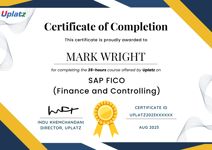
Data Architect Career Path
Self-paced videos, Lifetime access, Study material, Certification prep, Technical support, Course Completion Certificate
Uplatz
Summary
- Uplatz Certificate of Completion - Free
Add to basket or enquire
Overview
Uplatz provides this comprehensive Career Path program on Data Architect to help you acquire skills for becoming a successful data architect. It is a self-paced program consisting of video lectures on all courses related to data architecture. You will be awarded Course Completion Certificate at the end of the course.
This Data Architect Career Path program includes an extensive set of self-paced courses that will contribute to your skill-set in the data architecture world. The following courses are included in this career path:
- SQL Programming with MySQL Database
- Oracle PL-SQL Programming
- Oracle 21c DBA
- Talend
- Business Intelligence & Data Analytics
- SAP BO
- Tableau
- Power BI
- Python Programming
- R Programming
- Data Visualization with Python
- Data Visualization with R
- Data Science with Python
- Data Science with R
- Cloud Computing Basics
A data architect is a professional responsible for designing, creating, deploying, and managing an organization's data architecture. The role involves understanding the data needs of an organization and developing a blueprint or framework to ensure that data assets are properly stored, organized, integrated, and managed. Data architects work to ensure that data is available, reliable, and accessible for decision-making, analysis, and reporting purposes.
Key responsibilities of a data architect may include:
Data Modeling: Designing and creating data models that define the structure, relationships, and flow of data within an organization. This involves using tools and techniques to represent data entities, attributes, and their interconnections.
Database Management: Overseeing the design and management of databases, including selecting appropriate database management systems (DBMS), configuring databases, and ensuring data integrity and security.
Data Integration: Developing strategies and solutions for integrating data from various sources to provide a unified view. This includes dealing with data transformation, cleansing, and migration.
Metadata Management: Establishing and managing metadata, which provides information about the characteristics and context of data. This helps in understanding and documenting data lineage, quality, and usage.
Data Governance: Defining and implementing data governance policies and procedures to ensure data quality, security, and compliance with regulatory requirements.
Collaboration: Working closely with other IT professionals, such as database administrators, data analysts, and software developers, to implement and maintain the data architecture.
Technology Evaluation: Staying updated on emerging technologies and evaluating their suitability for meeting the organization's data needs. This may involve assessing new database systems, data storage solutions, and data processing technologies.
Skills required for a data architect include:
Data Modeling: Proficiency in creating conceptual, logical, and physical data models using tools like ERwin, IBM Data Architect, or similar.
Database Management Systems: Strong knowledge of various database systems (e.g., SQL Server, Oracle, MySQL, MongoDB) and their capabilities.
Data Integration: Experience with ETL (Extract, Transform, Load) tools and techniques for integrating data from diverse sources.
Programming and Scripting: Knowledge of programming languages like SQL, Python, or Java for writing scripts and queries.
Data Governance: Understanding of data governance principles and the ability to implement policies and procedures to ensure data quality and compliance.
Communication Skills: Effective communication skills to collaborate with cross-functional teams and explain complex technical concepts to non-technical stakeholders.
Analytical Thinking: Strong analytical and problem-solving skills to address complex data-related challenges.
Project Management: Ability to manage projects related to data architecture, ensuring timelines and deliverables are met.
Industry Knowledge: Understanding of the industry-specific challenges and requirements related to data management.
Continuous Learning: Given the rapidly evolving nature of technology, a data architect should be committed to continuous learning and staying updated on industry trends and best practices.
Course media
Description
The career path for a data architect typically involves a progression of roles and increasing responsibilities within the field of data management and information technology. Here's a general career path for a data architect, along with potential job opportunities at different stages:
Entry-Level Positions:
- Data Analyst/Database Administrator: Gain experience working with databases, understanding data structures, and developing basic data management skills.
- Data Engineer: Focus on designing and implementing data pipelines, ETL processes, and data integration solutions.
Mid-Level Positions:
- Database Developer/Modeler: Dive deeper into database design, data modeling, and optimizing database performance.
- Senior Data Engineer: Take on more complex data integration projects, work with big data technologies, and collaborate with other IT professionals.
Transition to Data Architecture:
- Data Architect (Junior/Associate): Start specializing in data architecture, work on developing and implementing data models, and participate in data governance initiatives.
Advanced Positions:
- Data Architect (Senior/Lead): Lead the design and implementation of comprehensive data architectures, oversee data governance strategies, and collaborate with business leaders to align data initiatives with organizational goals.
- Enterprise Architect: Extend responsibilities beyond data to include broader IT architecture, ensuring alignment with overall business strategies.
Management and Leadership Roles:
- Director/Head of Data Management: Manage a team of data professionals, oversee data-related projects, and contribute to the strategic direction of data initiatives.
- Chief Data Officer (CDO): As a C-level executive, provide leadership for the overall data strategy of the organization, ensuring data governance, compliance, and alignment with business objectives.
Consulting and Entrepreneurship:
- Data Architecture Consultant: Work independently or with consulting firms to provide expertise to multiple organizations on data architecture best practices and solutions.
- Start Your Own Data Consulting Firm: Entrepreneurs may choose to start their own consulting firms specializing in data architecture, providing services to businesses seeking expertise in managing and optimizing their data assets.
Education and Thought Leadership:
- Data Architecture Trainer/Instructor: Share knowledge and expertise by teaching data architecture courses or workshops.
- Author/Blogger/Speaker: Contribute to the field by writing articles, books, or speaking at conferences to share insights and trends in data architecture.
Job titles related to data architecture may vary across industries and organizations, but the core responsibilities remain consistent. It's important for individuals pursuing a career as a data architect to continually update their skills, stay informed about emerging technologies, and build a strong professional network within the data management community. Certification programs, such as those offered by professional organizations or technology vendors, can also enhance one's qualifications in the field of data architecture.
Who is this course for?
Everyone
Requirements
Passion and determination to achieve high goals!
Career path
- Data Architect
- Solution Architect
- Technical Architect
- Business Architect
- Enterprise Architect
- Systems Analyst
- Database Developer
- Data Engineer
- Data Strategist
- Data Analyst
- Data Modeler
- Technical Lead
- Cloud Platform Architect
- Director/Head of Data Management
- Chief Data Officer (CDO)
- Database Developer
- Application Developer
- Database Administrator
- Data Architecture Consultant
Questions and answers
Hi where is the link to the course
Answer:Hi Aken The link to the course can be obtained from the address bar of your browser when you open the course page. Or simply right click the course link and then select "copy link address". Team Uplatz
This was helpful.
Certificates
Uplatz Certificate of Completion
Digital certificate - Included
Course Completion Certificate by Uplatz
Reviews
Currently there are no reviews for this course. Be the first to leave a review.
Legal information
This course is advertised on reed.co.uk by the Course Provider, whose terms and conditions apply. Purchases are made directly from the Course Provider, and as such, content and materials are supplied by the Course Provider directly. Reed is acting as agent and not reseller in relation to this course. Reed's only responsibility is to facilitate your payment for the course. It is your responsibility to review and agree to the Course Provider's terms and conditions and satisfy yourself as to the suitability of the course you intend to purchase. Reed will not have any responsibility for the content of the course and/or associated materials.



